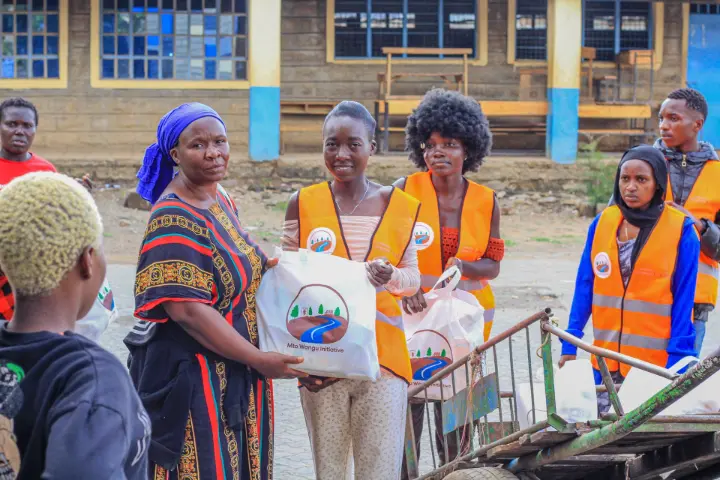This report provides an overview of the Mathare Relief Initiative, a program aimed at addressing the immediate needs of families affected by the devastating floods of April 2024, while laying the groundwork for long-term community resilience. Supported by the Canadian government, and other key stakeholders, this initiative embodies the spirit of solidarity and inclusivity. Mto wangu initiative remains committed to championing such programs to create sustainable change.

Background
Mathare, one of Nairobi’s oldest informal settlements, is home to over 206,564 residents based on Kenya National Bureau of Statistics, 2019. The area spans 3 square kilometers and is divided into four wards: Mlango Kubwa, Mabatini, Hospital, and Utalii. In April 2024, heavy rains led to severe flooding, leaving thousands displaced, homes destroyed, and public health severely compromised. This highlighted systemic urban challenges such as inadequate drainage systems, encroachment on riparian zones, and unplanned urbanization.
The Problem and Key Findings
The flooding disrupted lives across all four wards in Mathare, with over 7,800 households affected. Education for more than 4,500 students was interrupted due to damaged schools, and public health risks surged due to destroyed sanitation facilities. Community feedback revealed ongoing fear of recurring floods, mental health challenges, and financial distress for informal business owners.

Program Overview: Mathare Flood Relief Initiative
1. Launch of the Mathare Flood Relief and resilience Initiative
On 29th October, we officially launched the Mathare Flood Relief and Recovery Initiative, marking a significant milestone in our shared commitment to building resilience and promoting inclusive development. The event was a celebration of partnership, collaboration, and the power of community-led initiatives to address pressing challenges in informal settlements.
We were honored to recognize and celebrate the tireless efforts of youth groups, community networks, and organizations that have been pivotal in driving transformative change. Mto Wangu Initiative, in collaboration with SDI Kenya and Muungano wa Wanavijiji, has been at the forefront of disaster response in Mathare, addressing critical issues such as floods caused by climate change and the socio-economic impacts of the COVID-19 pandemic. These organizations have also been instrumental in empowering youth to reclaim and restore green spaces within Nairobi’s informal settlements, creating healthier and more sustainable urban environments.

The launch was made possible through the generous support of the High Commission of Canada in Kenya and UN-Habitat, whose unwavering dedication to promoting inclusive urban development has been a cornerstone of this initiative. Together, we reaffirmed our collective vision for cities where all residents, including slum dwellers, have equitable access to land, housing, and essential services.
2. Planning and Community Engagement
The initiative began with planning meetings involving local leaders, community representatives, volunteers, and donors, including the Canadian government representatives. Data collection identified 150 families most affected, and community feedback forums ensured the program design was inclusive and reflective of local priorities.

3. Program Implementation
The distribution phase took place in December 2024, providing relief to 150 families. Supplies included food, clean water, sanitation kits, among others. Volunteers ensured transparency, fairness, and inclusivity during the distribution process.
4. Donation Distribution Day
On distribution day, volunteers worked together to deliver various donations. Families expressed gratitude for the support, and the event brought smiles to their faces, symbolizing hope and unity during the festive season.

5. Broader Impact and Next Steps
The initiative is addressing immediate needs while emphasizing long-term planning. Future plans include advocating for policy reforms, upgrading drainage systems, and enhancing disaster preparedness through community training programs.
The Flood Relief Initiative is showcasing the power of collaboration in addressing urban vulnerabilities. Mto Wangu Initiative remains dedicated to fostering sustainable change, advocating for resilient urban planning, and empowering Mathare’s community to thrive. This program is a testament to what can be achieved through solidarity and commitment.